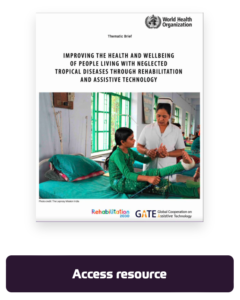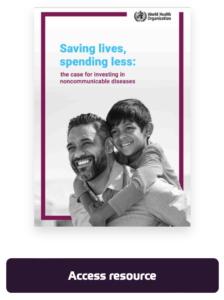Don’t forget the repository has been fully translated into French and Spanish.
We are continually adding resources to the ReLAB-HS rehabilitation resource repository and every now and again resources are released which are important to share far and wide.
This month we’ve had two resources added which we think you should hear about one focusses on improving the health and well-being of those living with tropical diseases and the other is a report which focusses on investing in non-communicable diseases.
Improving the Health and Wellbeing of People Living With Neglected Tropical Diseases Through Rehabilitation and Assistive Technology
 The purpose of this publication is to highlight the unmet need for rehabilitation and assistive technology for persons living with neglected tropical diseases, and provide recommendations for improving access to services through an integrated service delivery model.
The purpose of this publication is to highlight the unmet need for rehabilitation and assistive technology for persons living with neglected tropical diseases, and provide recommendations for improving access to services through an integrated service delivery model.
This work supports the newly developed Road map for Neglected Tropical Diseases 2021–2030: Ending the neglect to attain the Sustainable Development Goals; the Rehabilitation 2030 initiative and the Global Disability Action Plan, and the Resolution WHA71.8 Improving access to assistive technology.
Saving lives, spending less: the case for investing in noncommunicable diseases
 This report (also known as The Global NCD Investment Case) outlines the health and economic benefits of investing in low- and lower-middle-income countries. The report explains the noncommunicable diseases (NCDs) Best Buys providing policymakers, donors, advocates, and other relevant stakeholders with a sound and evidence-based economic case for investing in and scaling up these measures.
This report (also known as The Global NCD Investment Case) outlines the health and economic benefits of investing in low- and lower-middle-income countries. The report explains the noncommunicable diseases (NCDs) Best Buys providing policymakers, donors, advocates, and other relevant stakeholders with a sound and evidence-based economic case for investing in and scaling up these measures.
A must read for those working in policy, research and low income settings.
Improving Access to Vital Resources
Rehabilitation services are a vital component in maintaining and improving population health, but services are only as good as the workforce delivering them. For the workforce to have the opportunity to provide the very best in patient care, it needs to be educated and supported through access to high-quality, evidence-based resources.
The Resource Repository provides a place where all the excellent resources developed by rehabilitation stakeholders around the world can be stored.
By improving the discoverability of globally relevant guidelines, manuals and toolkits, more rehabilitation professionals are able to find and use them. This ultimately improves dissemination of knowledge globally, and improves healthcare through the application of digital knowledge. This means better care of patients no matter where they are in the world.
You Can Get Involved – Download as well as Contribute Resources
The repository is a fully searchable web portal available at resources.relabhs.org. It has been designed from the from the ground up to be useful and relevant for all rehabilitation stakeholders and care providers around the world. This means you can access the repository on mobile devices or a computer and anywhere you have an internet connection.
As well as accessing the site from anywhere you can upload from anywhere too. When uploaded to the site the repository manager will check submissions to ensure the best content is available to be accessed. The resource repository manager will also continue to search for and evaluate new resources in an ongoing effort to keep new resources easily accessible to all.
This work is supported by the USAID funded Learning Acting Building for Rehabilitation in Health Systems (ReLAB-HS) project and is not possible without the generous and committed contribution of the Leahy War Victims fund.
ReLAB-HS is made possible by the generous support of the American people through the United States Agency for International Development (USAID) and is implemented under cooperative agreement number 7200AA20CA00033. The consortium is managed by prime recipient, Johns Hopkins Bloomberg School of Public Health.

